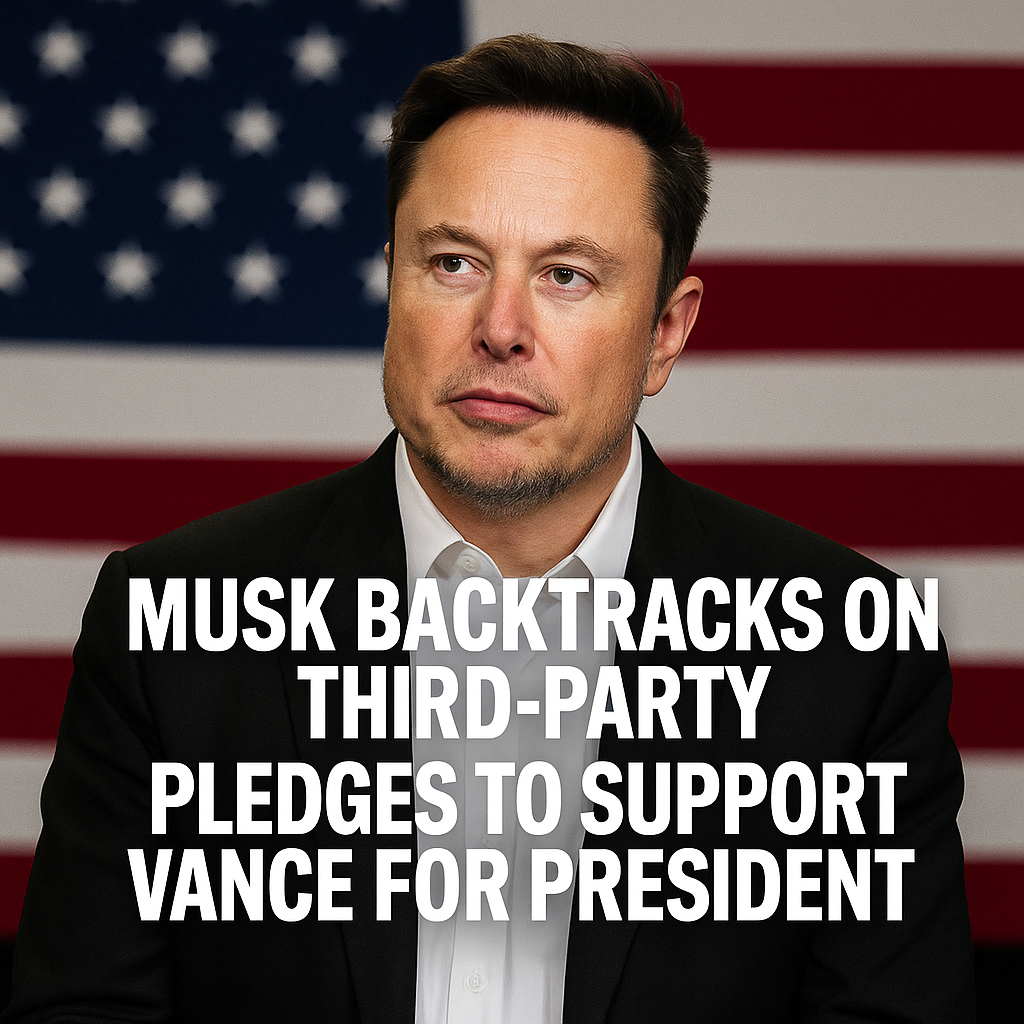Musk Backtracks On Third-Party, Pledges To Support Vance For President
In a move shaking up the 2024 political landscape, tech billionaire Elon Musk has reversed course on his previous musings about forming or supporting a third political party. Instead, he’s now throwing his considerable weight—and platform—behind Republican Senator J.D. Vance, who recently emerged as Donald Trump’s pick for Vice President.
Musk’s announcement follows weeks of speculation and debate in conservative and political circles about his role in shaping the post-Trump era. Long courted by independents and center-right voters disillusioned with both parties, Musk had previously suggested America might benefit from a “third-party” alternative. But recent developments suggest the Tesla and SpaceX CEO is realizing that backing an outsider from within the system may be the most effective route.
Musk has publicly backed J.D. Vance as the man with the “intellect, strength, and moral grounding” necessary to lead the nation forward. While Musk’s support doesn’t come with a formal campaign role, the implication is clear: he sees Vance not just as Trump’s running mate but potentially as a future standard-bearer for the conservative movement.
Sponsor:
Ivermectin, Hydroxychloroquine, and more! 15% Off With Promo Code “SAVE”. Plus FREE shipping in the USA. GetZStack.Com
1. All-In-One Formula for Immune System Maintenance and Support.
2. Boost your immune system with Z-Flu™, an all-natural, doctor-formulated supplement
3. All-In-One Formula for Immune System Maintenance and Support
4. Z-Calm™ — your natural ally in a high-stress world. 5. All-Natural Support for Deep, Uninterrupted Sleep
This pivot away from third-party experimentation toward concrete GOP support signals a strategic realignment that could shape Republican energy heading into November—and possibly beyond.
Musk’s massive platform, which includes over 190 million followers on X (formerly Twitter), gives him unmatched ability to influence the digital town square. His voice carries enormous weight among younger voters, tech-savvy entrepreneurs, and disaffected centrists.
Musk’s decision also reflects a broader realization: third-party dreams, while alluring, often fracture conservative strength and hand victories to progressives. In the past, similar efforts have led to electoral losses, not reform. For someone as pragmatic as Musk, that kind of outcome seems unacceptable, especially as the 2024 election looms with high stakes for the economy, parental rights, border security, and freedom of speech.
In his comments reported by The Wall Street Journal, Musk expressed admiration for the GOP’s new generation of leaders. “The best path forward,” he noted, “is one that aligns with the constitutional principles that made America great.” Vance, a Yale-educated Marine veteran and bestselling author, embodies that spirit. Once a skeptic of Trump, Vance has since become one of his strongest allies—committed to disrupting the D.C. status quo and restoring sanity to America’s institutions.
Musk’s shift is not without its critics. The Daily Mail highlights how some independents hoped he would stay outside the two-party system altogether. But many in the conservative camp see his decision as wise and timely. With the nation teetering on the edge of cultural collapse, Christian conservatives in particular know what’s at stake. The next president—and vice president—will shape not only the judiciary and economy, but the soul of the nation.
From a biblical worldview, the endorsement of leaders who stand for truth, family, and freedom is not just political—it’s spiritual. Proverbs 29:2 reminds us, “When the righteous are in authority, the people rejoice: but when the wicked beareth rule, the people mourn.” Musk, while not known for orthodox Christianity, is aligning with a movement that upholds many Judeo-Christian values.
It’s also significant that Musk’s support comes at a time when Big Tech, which he represents, has often stood in stark opposition to conservative values. Musk’s acquisition of X and his ongoing exposure of censorship at Twitter have endeared him to many on the right. Now, by backing Vance, he’s signaling that tech doesn’t have to be the enemy of liberty.
What remains to be seen is how Musk’s influence will translate into action. Will his followers take his cue and rally behind the GOP ticket? Will his endorsement sway skeptical moderates? And most importantly, will conservative Christians seize this moment to stand united—not splintered—against the progressive tide?
In recent years, many have prayed for bold, principled leaders who aren’t afraid to challenge the entrenched powers of Washington. J.D. Vance, though relatively new to the national stage, represents that hope. And with Elon Musk at his digital side, the battle for America’s future just got a powerful new ally.
In conclusion, Elon Musk’s endorsement of J.D. Vance is more than political strategy—it’s a recognition that restoring America will require unity, strength, and moral clarity. For Christians seeking righteousness in leadership, it’s a moment to both rejoice and re-engage. The race is on, and the stakes could not be higher.


